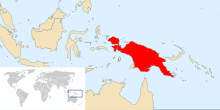Dryadorchis
Appearance
| Dryadorchis | |
|---|---|

| |
| Dryadorchis barbellata | |
| Scientific classification | |
| Kingdom: | Plantae |
| Clade: | Tracheophytes |
| Clade: | Angiosperms |
| Clade: | Monocots |
| Order: | Asparagales |
| Family: | Orchidaceae |
| Subfamily: | Epidendroideae |
| Tribe: | Vandeae |
| Subtribe: | Aeridinae |
| Genus: | Dryadorchis Schltr. |

| |
| Distribution of Dryadorchis. It is endemic to New Guinea. | |
Dryadorchis is a genus of flowering plants from the orchid family, Orchidaceae.[1] It is endemic to New Guinea.[1][2]
Description
[edit]The stems are very short, and they bear subfalcate leaves. The racemose inflorescences have a swollen rhachis. They produce short-lived flowers with a long, slim column, which houses four pollinia. The unspurred labellum has a concavity in its centre.[3][4]
Etymology
[edit]The genus name of Dryadorchis refers to Dryad, a tree nymph or tree spirit in Greek mythology.[5]
Ecology
[edit]Dryadorchis grows epiphytically at elevations of 0-1700 m above sea level.[3]
Taxonomy
[edit]Proposed merging with other genera
[edit]It was proposed to merge this genus with Sarcochilus and Thrixspermum, which however was rejected.[3]
Species
[edit]It contains 5 known species, which are all endemic to New Guinea:[1][6]
- Dryadorchis barbellata Schltr.
- Dryadorchis dasystele Schuit. & de Vogel
- Dryadorchis huliorum (Schuit.) Christenson & Schuit.
- Dryadorchis minor Schltr.
- Dryadorchis singularis (J.J.Sm.) Christenson & Schuit.
See also
[edit]References
[edit]- ^ a b c "Dryadorchis Schltr". Plants of the World Online. Royal Botanic Gardens, Kew. Retrieved 14 January 2022.
- ^ Marshall, A., & Beehler, B. (2011). "Ecology of Indonesian Papua Part One." Tuttle Publishing.
- ^ a b c Schuiteman, A., & Christenson, E. A. (1995). "A synopsis of Dryadorchis Schltr.(Orchidaceae)." Blumea: Biodiversity, Evolution and Biogeography of Plants, 40(2), 421-424.
- ^ Schuiteman, A., & Ormerod, P. (1998). "Ophioglossella (Orchidaceae-Aeridinae), a new genus from Papua New Guinea." Kew Bulletin, 741-745.
- ^ Burkhardt, Lotte (2022). Eine Enzyklopädie zu eponymischen Pflanzennamen [Encyclopedia of eponymic plant names] (pdf) (in German). Berlin: Botanic Garden and Botanical Museum, Freie Universität Berlin. doi:10.3372/epolist2022. ISBN 978-3-946292-41-8. S2CID 246307410. Retrieved January 27, 2022.
- ^ Berg Pana, H. 2005. Handbuch der Orchideen-Namen. Dictionary of Orchid Names. Dizionario dei nomi delle orchidee. Ulmer, Stuttgart
External links
[edit] Data related to Dryadorchis at Wikispecies
Data related to Dryadorchis at Wikispecies
